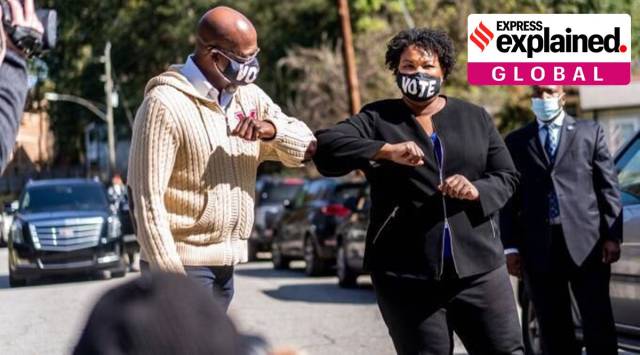Explained: Who is Stacey Abrams, why is she credited for Democrat wins in Georgia?
Abrams, 46, a lawyer, entrepreneur, and novelist apart from being a Democratic politician, became the minority leader in Georgia’s lower chamber in 2011, and began strengthening the party’s base.
 Stacey Abrams with Raphael Warnock, who won one of the Georgia runoffs for the Democratic party, on December 6. (Photo: Twitter/ @staceyabrams)
Stacey Abrams with Raphael Warnock, who won one of the Georgia runoffs for the Democratic party, on December 6. (Photo: Twitter/ @staceyabrams) The US state of Georgia, traditionally a stronghold of President Donald Trump’s Republican Party, has recently delivered crucial victories for the Democratic Party.
In the November 3 election, the state voted for president-elect Joe Biden, and in one of the two Senate runoffs on January 5, picked Democrat Raphael Warnock to replace incumbent Republican Kelly Loeffler. In the second runoff, another Democrat, Jon Ossoff, looks set to defeat Republican David Perdue, who has been Georgia’s Senate representative since 2015.
The credit for these victories is widely being given to Stacey Abrams, a Democrat organiser in Georgia who has spent the last 10 years building the party’s political infrastructure and planning strategy in the state.
With new votes joining the tally, we are on a strong path. But even while we wait for more, let’s celebrate the extraordinary organizers, volunteers, canvassers & tireless groups that haven’t stopped going since Nov. Across our state, we roared. A few miles to go…but well done!
— Stacey Abrams (@staceyabrams) January 6, 2021
Who is Stacey Abrams?
Abrams is a native of Mississippi state, which like Georgia, is part of what is referred to as the Deep South, a sub-region in the US which resisted the abolition of slavery during the 19th century, and until the mid to late 20th century saw white supremacy, racial segregation, widespread voter suppression and violence against African American people.
Abrams, 46, who is a lawyer, entrepreneur, and novelist apart from being a Democratic politician, became the minority leader (equivalent to leader of opposition) in Georgia’s lower chamber in 2011, and began strengthening the Democratic party’s base in the state since then.
In 2014, a year after the US Supreme Court weakened the landmark Voting Rights Act by removing its safeguards and lowering federal oversight, Abrams started the New Georgia Project, which focussed on people of colour, those 18 to 29 years of age, and unmarried women as key to winning Georgia; describing the groups as the “New American Majority”.
Then in 2018, Abrams ran for governor in Georgia, becoming the first African American woman to do so in history, but lost to Republican Brian Kemp, who was then serving as secretary of state in Georgia’s government.
Unlike in India, all US elections — federal, state, and local — are directly organised by the ruling governments of individual states, and the responsibility of conducting elections falls on the state’s secretary of state. In many states, including Georgia, this position is occupied by an elected politician.
During his six-year tenure as Georgia’s secretary of state, Kemp was accused of voter suppression by critics, who questioned his cancelling of voter registrations of over 10 lakh state residents for reasons such as error or “inactivity”. Although Kemp defended this as maintenance of voter rolls, he was accused of disenfranchising Black voters, who lean Democratic.
In the 2018 race, Kemp was able to beat Abrams by just over 50,000 votes, which prompted her to launch a grassroots campaign called Fair Fight, to redouble registration efforts and counter the alleged voter suppression tactics which she believed led to her loss.
The 2020 election
Then, in the two years before the 2020 presidential elections, Abrams along with ground-level organisations was able to register over 8 lakh voters in Georgia – mainly from Black, Hispanic and Asian communities.
These voters played a critical role in delivering the state to Biden, who carried it by a razor-thin margin of 0.24 per cent over the incumbent Trump, becoming the first Democrat to win here in over two decades.
The same voters are now believed to have boosted Democrats in the Senate runoff elections, one of which has been called for the Democrat Warnock. Should Ossoff follow Warnock’s lead, the Democrats would gain control of the US Senate, where they would be able to pass important legislation and get Biden’s cabinet appointments approved.
Experts have said that apart from voter registration, Georgia’s changing demographics have also played an important role in loosening the Republican Party’s vice-grip over the state. Like in many parts of the US, Georgia has in recent years seen more people moving to the cities and suburbs – a shift that is known to benefit the Democrats.
Abrams, who is now being celebrated by many as a voting rights champion, is expected to run for Georgia governor again in 2022. Many in the Democratic Party are rooting for Abrams to become its chairwoman, or take up an important position in the Biden administration.
- 01
- 02
- 03
- 04
- 05






































